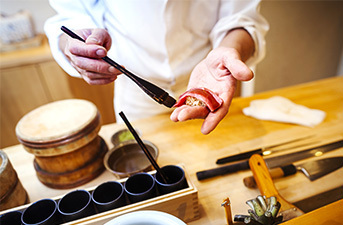Dates
Today
Tomorrow
Clear
Filters
What do you want to eat?
Washoku
No Result Found.
Dietary restrictions
Vegan
No Result Found.
Time of day
No Result Found.
Accessibility
No Result Found.
Language
No Result Found.
Sort
Host Donations (high to low)
Newest First
Price (low to high)
Price (high to low)
Rating
Number of Reviews
Clear
Apply
No experiences found.
Tailor-Made Tours
Can’t find what you’re looking for? We can plan a custom-made food experience or itinerary just for you.

Top Rated Experiences
Food Tours
KYOTO
Small Group, All-Inclusive Kyoto Night Food and Culture Tour
from ¥12,725
With 2 drinks